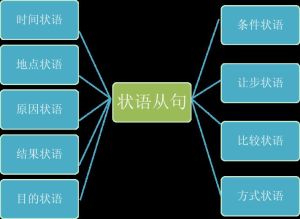語法詳解
從屬連詞
 原因狀語從句
原因狀語從句主要的有because, as, since,for,seeing (that), now (that), considering (that),in that等:
The woollyshrank because it was washed badly. 毛衣因洗得不得法而縮水。
I can’t get to sleep because of the noise outside. 由於外面聲音嘈雜我睡不著。
Since [As] we’ve no money, we can’t buy it. 由於我們沒錢,我們無法購買它。
Seeing that it’s raining, we’d better stay indoors. 既然外邊在下雨,我們最好待在室內。
Now that you are here, you’d better stay. 你既然來了,最好還是留下吧(既來之,則安之)。
除以上提到的大家比較熟悉的引導原因狀語從句的從屬連詞外,when有時也可引導原因狀語從句(when表示“既然”)
I won’t tell you when you won’t listen. 既然你不想聽,我就不告訴你了。
結構
關於not…because結構該結構中的否定詞有時否定主句,有時否定從句,一般要根據句子的意思作出正確或合乎邏輯的理解。若not否定主句,最好在because之前用逗號,否則會引起歧義,如下句在沒有特定上下文時就有兩種解釋:I didn’t go because I was afraid. 我沒有去是因為怕。/ 我不是因為怕才去。
不過若because之前有just修飾,一般認為not 是否定從句的:
You shouldn’t get angry just because some people speak ill of you. 你不要因為有人說你壞話而生氣。
習慣用法
because習慣上不與so連用漢語習慣上說“因為…所以…”,但英語習慣上卻不能將 so與because連用:
因為下雨,所以我們呆在家裡。
正:Because it was raining, we stayed at home. / It was raining, so we stayed at home.
誤:Because it was raining, so we stayed at home.
短語轉換
because 從句與 because of短語的轉換Because引導的原因狀語從句有時可與because of 短語轉換:
He can’t come because he is ill. / He can’t come because of his illness. 他因病不能來。
I said nothing about it because his wife was there. / I said nothing about it because of his wife’s being there. 因為他妻子在那兒,我對此事隻字未提。
比較:because, since, as和for
1) because語勢最強,用來說明人所不知的原因,回答why提出的問題。當原因是顯而易見的或已為人們所知,就用as或 since。
I didn't go, because I was afraid.
Since /As the weather is so bad, we have to delay our journey.
2) 由because引導的從句如果放在句末,且前面有逗 號,則可以用for來代替。但如果不是說明直接原因,而是多種情況加以推斷,就只能用for。
He is absent today, because / for he is ill.
He must be ill, for he is absent today.
從句用法
 原因狀語從句
原因狀語從句1. because引導的原因狀語從句一般放於主句之後, because表示直接原因, 語氣最強, 最適合回答 why引導的疑問句。例如: I do it because I like it. 我做這件事是因為我喜歡。
注意: “not ... because”結構中的not否定的是because引導的整個從句, 例如: The country is not strong because it is large. 國強不在大。
2. since引導的原因狀語從句一般放於主句之前表示已知的、 顯然的理由(通常被翻譯成“既然”), 較為正式, 語氣比because弱。例如: Since you are free today, you had better help me with my mathematics. 既然今天你休息, 你最好幫我補習數學。
注意: seeing (that), now (that), considering (that), in that這幾個辭彙與since引導的原因狀語從句意思相近, 都表示“既然”。例如: Seeing (that) he refused to help us, there’s no reason that we should now help him. 他既然曾經拒絕幫助我們, 我們現在沒有理由要來幫助他。// Now (that) you are grown up, you should not rely on your parents. 既然你長大了, 就不應該依靠你的父母了。// Considering (that) everybody is here, let’s begin our discussion. 既然大家都到了, 我們就開始討論吧。// In that he is ill, he feels unable to do it. 因為有病, 他覺得做不了那件事。
3. as 引導原因狀語從句時表示附帶說明的“雙方已知的原因”, 語氣比since弱, 較為正式, 位置較為靈活(常放於主句之前)。例如: As it is raining, you’d better take a taxi. 既然在下雨, 你最好乘出租汽車。// As you are tired, you had better rest. 既然累了, 你最好休息一下。// I went to bed early, as I was exhausted. 我睡得早, 因為我筋疲力盡了。
4. for引導的原因狀語從句並不說明主句行為發生的直接原因, 只提供一些輔助性的補充說明, for引導的原因狀語從句只能放於主句之後並且必須用逗號將其與主句隔開。例如: He could not have seen me, for I was not there. 他不可能見過我, 因為我不在那裡。
考題解析
[考題1] ____ you’ve got a chance, you might as well make full use of it. (1999)A. Now that B. After C. Although D. As soon as
[答案] A
[解析] 主句與從句之間存在因果關係, 且“you’ve got a chance”表示一個顯而易見的原因, 因此應選用表原因的now that。
[考題2] He found it increasingly difficult to read, ____ his eyesight was beginning to fail. (2006北京)
A. and B. for C. but D. or
[答案] B
[解析] “his eyesight was beginning to fail”是“he found it increasingly difficult to read”的原因, 因此本題應選用可以表示原因的連詞for引導原因狀語從句。
[考題3] A man cannot smile like a child, ____ a child smiles with his eyes, while a man smiles with his lips alone. (2006湖南)
A. so B. but C. and D. for
[答案] D
[解析] 下劃線處之後的句子補充說明“a man cannot smile like a child”的原因, 應選用for表原因。

